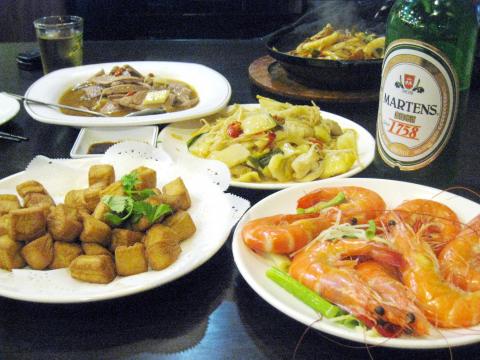A distinctive feature of Taiwan’s culinary landscape, the rechao (熱炒, literally “hot-fry”) joint is a perennial favorite with its fresh seafood, bargain prices and unpretentious atmosphere. I usually avoid such places, however, for several reasons, not least of which are the sometimes dirty surroundings, questionable hygiene standards, and inebriated men playing drinking games at a deafening volume while smoking like chimneys.
Located in the heart of Taipei’s East District (東區), Xanadu (鮮納肚) has restored my faith in rechao restaurants. Though boasting the typical trappings, including beer girls, it is an updated and much tidier version.
The interior is orderly and brightly lit; the utensils look clean. There is no fishy smell and smoking is not allowed until 9pm at the earliest, according to the restaurant’s very sociable proprietor.

Photo: Ho Yi, Taipei Times
Many of Xanadu’s dishes are made from offal. Popular dishes include sauteed pork liver (香煎豬肝, NT$100), which is delectably tender and doesn’t leave a metallic taste in the mouth like other restaurants’ versions do.
The extensive seafood menu includes sashimi platters of salmon, tuna, swordfish and squid that cost between NT$100 and NT$190 per dish.
The dragon balls (鹹酥龍珠, NT$150), or octopus mouths fried with scallion, chili and peanuts, come recommended, though they could be habit-forming.

Photo: Ho Yi, Taipei Times
Xanadu’s shuizhu pork slices (水煮肉片), boiled strips of pork and vegetables served with oil and spices, is a localized version of a Sichuan specialty. By localized, I mean the dish lacks the numbing quality of the Sichuan peppercorn. The dish comes in three sizes, with the smallest (NT$300) enough for a group of three.
The open seafood display offers options that are often not on the menu. Ask the waitstaff for recommendations, but treat the response with a healthy dose of skepticism. On a recent visit, my dining partners and I ordered a crab that cost NT$1,000 on the recommendation of our server. It turned out to be very disappointing.

A vaccine to fight dementia? It turns out there may already be one — shots that prevent painful shingles also appear to protect aging brains. A new study found shingles vaccination cut older adults’ risk of developing dementia over the next seven years by 20 percent. The research, published Wednesday in the journal Nature, is part of growing understanding about how many factors influence brain health as we age — and what we can do about it. “It’s a very robust finding,” said lead researcher Pascal Geldsetzer of Stanford University. And “women seem to benefit more,” important as they’re at higher risk of

March 31 to April 6 On May 13, 1950, National Taiwan University Hospital otolaryngologist Su You-peng (蘇友鵬) was summoned to the director’s office. He thought someone had complained about him practicing the violin at night, but when he entered the room, he knew something was terribly wrong. He saw several burly men who appeared to be government secret agents, and three other resident doctors: internist Hsu Chiang (許強), dermatologist Hu Pao-chen (胡寶珍) and ophthalmologist Hu Hsin-lin (胡鑫麟). They were handcuffed, herded onto two jeeps and taken to the Secrecy Bureau (保密局) for questioning. Su was still in his doctor’s robes at

Last week the Democratic Progressive Party (DPP) said that the budget cuts voted for by the China-aligned parties in the legislature, are intended to force the DPP to hike electricity rates. The public would then blame it for the rate hike. It’s fairly clear that the first part of that is correct. Slashing the budget of state-run Taiwan Power Co (Taipower, 台電) is a move intended to cause discontent with the DPP when electricity rates go up. Taipower’s debt, NT$422.9 billion (US$12.78 billion), is one of the numerous permanent crises created by the nation’s construction-industrial state and the developmentalist mentality it

Experts say that the devastating earthquake in Myanmar on Friday was likely the strongest to hit the country in decades, with disaster modeling suggesting thousands could be dead. Automatic assessments from the US Geological Survey (USGS) said the shallow 7.7-magnitude quake northwest of the central Myanmar city of Sagaing triggered a red alert for shaking-related fatalities and economic losses. “High casualties and extensive damage are probable and the disaster is likely widespread,” it said, locating the epicentre near the central Myanmar city of Mandalay, home to more than a million people. Myanmar’s ruling junta said on Saturday morning that the number killed had